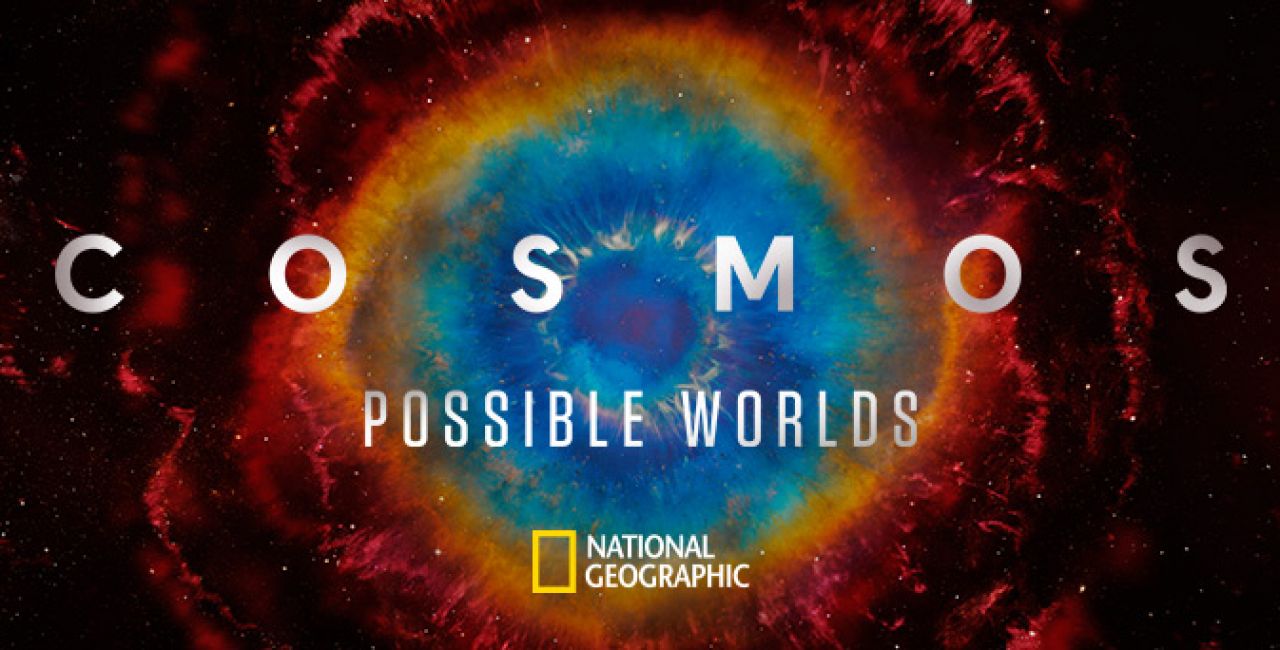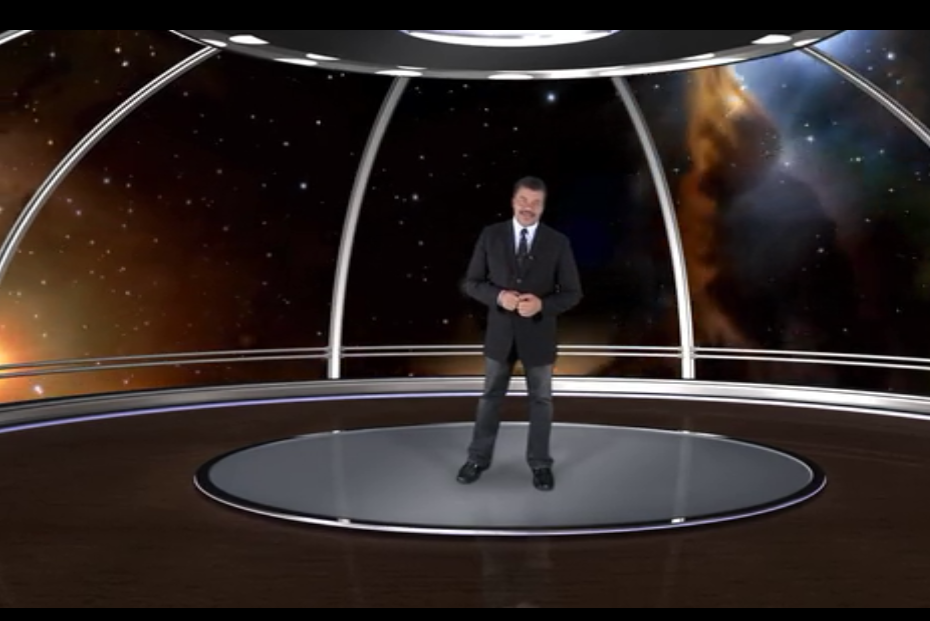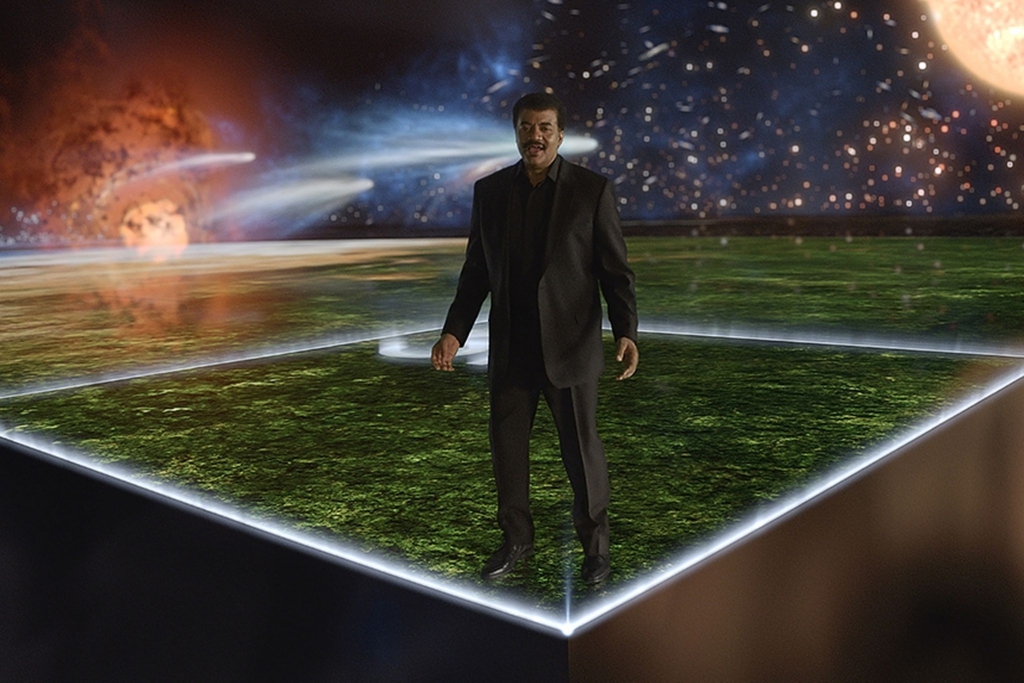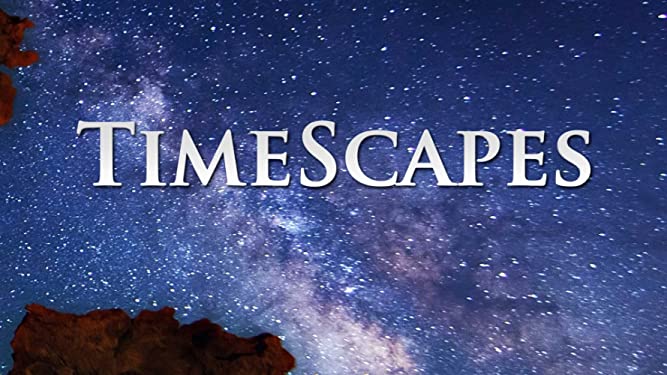There’s so much intriguing information, possibility and daring inside the modern-day version of Cosmos: A Spacetime Odyssey, which updates Carl Sagan‘s epically important Cosmos: A Personal Voyage, that there’s also a risk of overlooking the simple parts of it.
Case in point: The series kicks off with a creative, visually impressive 45 minutes built around rock star astrophysicist Neil deGrasse Tyson and exists on the Fox network in primetime for 13 hours because Seth MacFarlane (Family Guy) wanted it to and because he has the power to make something that incongruous actually happen. Cosmos: A Spacetime Odyssey has the stamp of authenticity not just because Tyson is involved but also because Sagan’s wife, Ann Druyan, is an executive producer, writer and director. With a mix of Tyson’s magnetic personality and ability — like Sagan before him — to make science understandable to people who aren’t scientists, plus whimsical but informative use of animation and a visual device called the “cosmic calendar,” Cosmos bites off an enormous chunk of ambitious knowledge-spreading in the first episode.
One would assume that will continue and we’ll all be the better for it. The series will also air on Monday, March 10 at 10 p.m. on the National Geographic Channel and will be, according to Fox, the largest global launch of a television series ever because it will be on 123 Fox-branded channels in 125 countries and 90 NatGeo channels in over 170 countries and 45 languages. Set your DVRs and bring the kids if you have them.
OK, but let’s back up a minute to what makes Cosmos something truly profound. Remember that Sagan’s original was also 13 parts, but it appeared on PBS and it premiered in 1980. While the show — and Sagan — became immensely popular, Cosmos: A Personal Voyage was essentially an idea shared (or not) in a more private, less polarized time. To essentially teach science on primetime on a broadcast network in 2014 is amazingly bold.
Why? Because science is godless. And the United States is a strongly religious country. And because the Internet makes everything a water-cooler conversation that is often fractured into one side vs. the other without much openness to divergent thought or understanding opposing values. So the idea that Tyson gets an hour on a Sunday night to blow your mind with science is, in fact, mind-blowing.
How do you think this part of the show is going to go over, as Tyson explains how the world was created by the Big Bang Theory:
“Our entire universe emerged from a point smaller than a single atom,” Tyson says. “Space itself exploded in a cosmic fire, launching the expansion of the universe and giving birth to all the energy and all the matter we know today. I know that sounds crazy, but there is strong observational evidence to support the big bang theory.”
Evidence or not, the guess here is a whole lot of people who don’t understand science or don’t want to try to understand it based on their religious beliefs are going to have a hard time coming to terms with this new Cosmos.
But that’s what makes it so thrilling. Tyson clearly states in the opening minutes of Cosmos: A Spacetime Odyssey that the study of our world is based on only science . To reach conclusions, we must “test ideas by experiment and observation,” Tyson notes. If they don’t hold up — as faith often doesn’t under scientific examination — then those ideas are tossed out.
This very first episode has so much information in it that the first 15 minutes seem like a study course and might prove slow to some folks as Tyson diligently starts explaining the solar system piece by piece. But Cosmos picks up with the help of executive producer Brannon Braga‘s sci-fi touches and some early animation that follows the plight of Giordano Bruno, a Dominican friar and astronomer who made one very, very bold guess of an idea about the infinite nature of the world that got him in loads of trouble with the Catholic Church in his native Italy. Why is his story, animated here, so interesting?
Whether he’s discussing NASA’s impact on our cultural psyche or emailing James Cameron about the night sky, Dr. Neil deGrasse Tyson has a remarkably consistent message: our future depends on a passionate embrace of science, and for that to happen, science needs to be cool. It should come as no surprise then that Tyson serves as host of the new show Cosmos: A Spacetime Odyssey, which debuts tonight as part of a major global event that will see the show simulcast across 10 domestic networks — with an introduction by President Obama, no less — before reaching more than 180 countries.
A reboot of Carl Sagan’s landmark 1980 program, the new Cosmos aims to be a primer on the incredible grandeur of the world around us, lionizing the scientists that have made our greatest discoveries, and hopefully stoking the fires for education and learning in the process. It’s hard to find fault with such noble ambitions, and while the presence of a new Cosmos is certainly welcome the initial episode tries so hard to appeal to modern audiences that at times it feels like it’s missing its own point: that the greatest wonders aren’t CG spectacle, but our own marvelous universe.
pening on the same cliff in Northern California where Sagan launched his own show 34 years ago, Cosmos begins with Tyson sounding the call that serves as the program’s main theme. “It’s time to get going again,” he says, before sweeping the viewer away on an exploration of our solar system. The vessel he uses throughout the show is dubbed the “Spaceship of Imagination,” a fictional craft that serves as a vantage point for Tyson and the show’s writers to zip around the universe.
The same concept was used in the original, but Sagan’s craft was primarily just seen from the inside. In the new version, the ship is realized as a shiny metal vehicle that zips to and fro, dodging asteroids and carrying out acrobatic flips. Inside, Tyson gazes intently out of its enormous viewing window — think the viewing screen on J.J. Abrams’ Enterprise — or looks through portals on the ceiling and floor, which give glimpses into the future or the past.
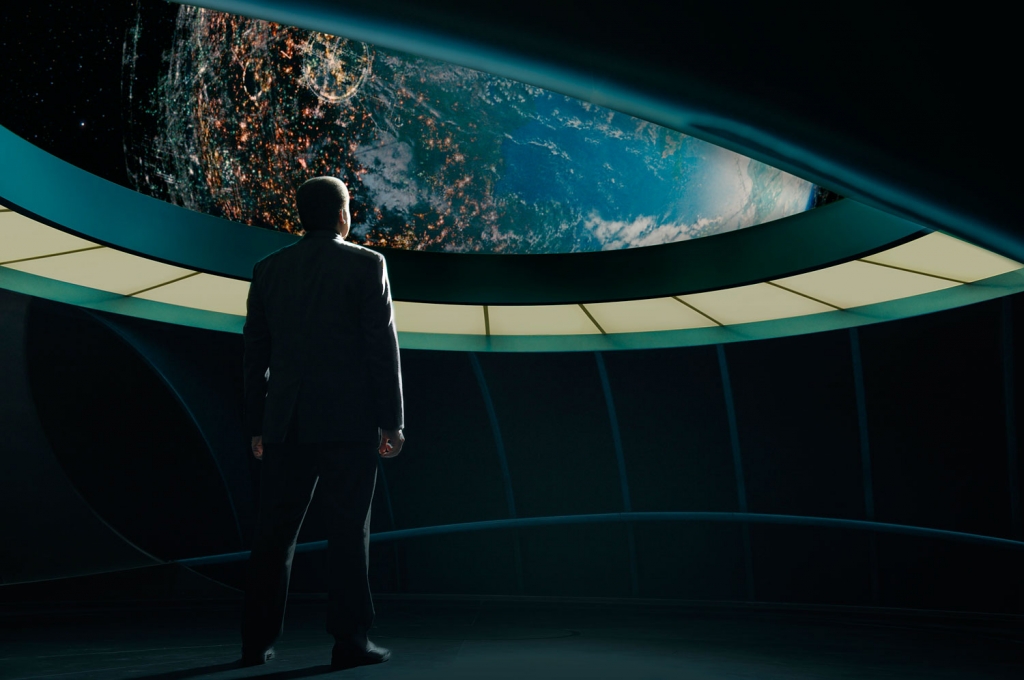
© 2014 FOX BROADCASTING
CR: Richard Foreman Jr./FOX
Designed by concept artist Ryan Church (Star Trek Into Darkness), the ship is certainly a flashy piece of effects work, but it ends up spending far too much time as the focal point of the show. Lingering closeups, with the far reaches of space reflected in its impossibly mirrored exterior, put the focus on fantasy — not the glory and wonder of the universe.
Tonally the show strikes just the right balance between education and inspiration. The science explored in the opening episode isn’t anything teenaged astronomy fans wouldn’t already be aware of, but the show doesn’t talk down to the viewer. That said, those already familiar with the antics of Dr. Tyson may feel like they’re getting a watered-down version of the real thing. In Cosmos he’s part Captain Kirk, part travelogue host, but he’s missing the charismatic urgency he’s become known for. The passion he displayed during a SXSW Q&A was infinitely more engaging than his performance in the show, even when he’s recounting his own inspirational childhood encounter with Sagan.
Thankfully Cosmos finds its footing in the final stretch, when Tyson visualizes the lifetime of our entire universe through the scale of a human calendar year. The Big Bang starts on January 1st — complete with an epic blast that threatens to envelop the host — whereas the breadth of human history encompasses just the final moments of December 31st. It’s the show at its very best: visually conveying an abstract concept, weaved into the context of humanity’s place in the universe.
It’s hard to imagine an educational show about science being any sort of major network hit in 2014 — no doubt part of the reason why Cosmos features so many visual effects — but Fox is leveraging multiple arms of its media empire to make it work. Even after the splashy debut the entire season will air both on the Fox network and on National Geographic, and as cable has proven shows don’t need to have a Friends-sized audience to work their way into the zeitgeist. One episode in, Cosmos certainly isn’t perfect, but the fact is that right now there’s nothing else like it on television. At SXSW Dr. Tyson said the goal of the show was simply to start a conversation — and by that measure, it’s certainly off to a good start.
